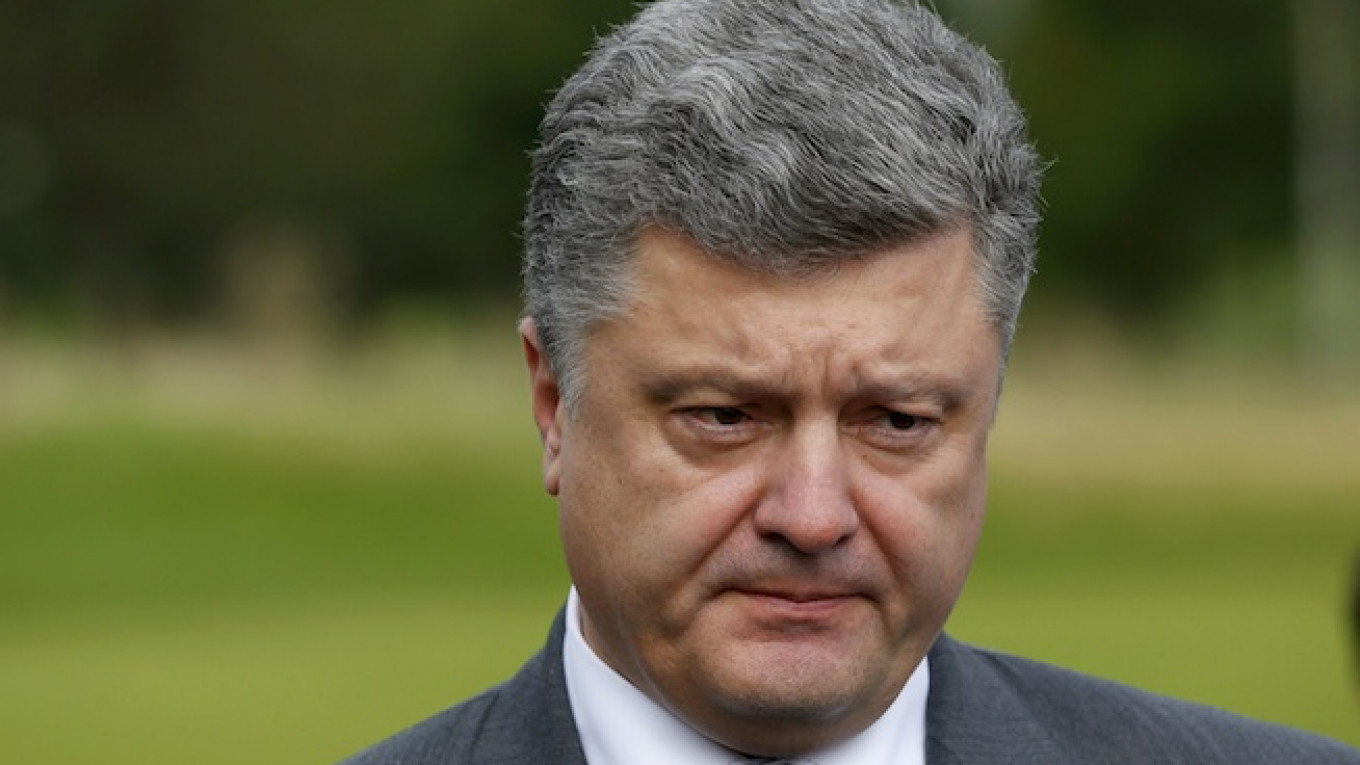KIEV — Ukraine's president said Friday that there could be no military solution to his country's crisis and said he hoped "a very fragile" cease-fire in the east would hold, allowing him to focus on rebuilding the shattered economy.
Petro Poroshenko also said a new wave of EU sanctions against Russia underlined Western solidarity with Kiev, and that the Ukrainian and EU parliaments could both ratify a deal on closer economic and political ties on Sept. 16.
Ukrainian forces have been battling pro-Russian separatists in eastern Ukraine for five months in a conflict in which more than 3,000 people have been killed. The two sides have been broadly observing a cease-fire since last Friday, despite sporadic violations.
"There is no military solution for this crisis," Poroshenko told EU and Ukrainian lawmakers and businessmen at the annual Yalta European Strategy conference — held in Kiev, not Yalta, due to Moscow's annexation of Ukraine's Crimea region in March.
"I hope the very fragile but efficient peace process which started exactly one week ago will have a continuation, for the [sake of] stable peace and security on the continent," he said, speaking in English.
Poroshenko said Ukraine's "association agreement" on closer EU ties, due to be ratified next week, provided a road map for the reforms that he said would be his top priority after parliamentary elections on Oct. 26, provided that peace holds in the east.
He said he had assembled a team of experts to help fight pervasive corruption, which he likened to "a cancer" eating away at the foundations of the Ukrainian state, but that improving the security situation remained the paramount concern.
"Investors will come when they feel safe in this country. That is why we are reforming the very ineffective security system and army, our court system … If we do not reform these things, even after the war, investors won't come," he said.
"I know personally how harmful the state can be for the investment climate," added Poroshenko, a billionaire former businessman once nicknamed the "Chocolate King" for who making his fortune in confectionery.
//Exchange of Prisoners
Eastern Ukraine has been largely quiet in recent days, and the tension following the cease-fire has gradually eased.
Overnight into Friday, Ukrainian forces and the separatists each handed over 37 prisoners-of-war at a site north of the rebel-held city of Donetsk. The exchange of all captives is one of the key elements of the cease-fire.
The Interfax news agency quoted Andrei Purgin, "deputy prime minister" of the self-proclaimed 'Donetsk People's Republic,' as saying the next exchange would take place on Sunday.
The rebels have said the cease-fire does not mean they have abandoned their demands for independence from Kiev, something Poroshenko again made clear on Friday was not on offer.
"To keep the country united, we need some decentralization of power," Poroshenko told the conference in Kiev. But he added: "The key issues of security, foreign policy, strategic points of development must be in the hands of the central power."
The crisis in Ukraine erupted late last year when Poroshenko's Moscow-backed predecessor, Viktor Yanukovych, rejected the association agreement with the EU and sought closer economic ties with Ukraine's communist-era overlord, Russia.
His decision triggered mass anti-government protests in Kiev that culminated in Yanukovych's flight to Russia. Moscow then seized Crimea and the separatist revolt in mainly Russian-speaking, heavily industrialized east Ukraine erupted in April.
Kiev and its Western backers accuse Russia of arming the rebels and sending forces into Ukraine and say this is proved by evidence they have provided, but Russia denies the accusation.
On Friday, another wave of EU sanctions against Russia came into force. They ban financing for some Russian state-owned companies and impose asset freezes against more Russian politicians. Moscow has vowed more retaliatory measures after already banning most Western food imports.
Welcoming the new sanctions as well as the pledges of support he received at a NATO summit in Wales last week, Poroshenko said: "I never felt before this level of solidarity … I feel myself a full member of the European family."
A Message from The Moscow Times:
Dear readers,
We are facing unprecedented challenges. Russia's Prosecutor General's Office has designated The Moscow Times as an "undesirable" organization, criminalizing our work and putting our staff at risk of prosecution. This follows our earlier unjust labeling as a "foreign agent."
These actions are direct attempts to silence independent journalism in Russia. The authorities claim our work "discredits the decisions of the Russian leadership." We see things differently: we strive to provide accurate, unbiased reporting on Russia.
We, the journalists of The Moscow Times, refuse to be silenced. But to continue our work, we need your help.
Your support, no matter how small, makes a world of difference. If you can, please support us monthly starting from just $2. It's quick to set up, and every contribution makes a significant impact.
By supporting The Moscow Times, you're defending open, independent journalism in the face of repression. Thank you for standing with us.
Remind me later.






